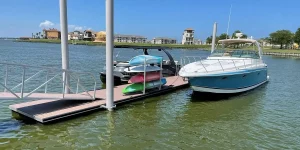When it comes to creating a waterfront haven, homeowners are always on the lookout for solutions that offer both functionality and aesthetic appeal. That’s where floating docks come into play. These innovative structures offer a wide range of benefits that can elevate your home and enhance your experience by the water.
From their adaptability to changing water levels to their easy installation and customization, floating docks provide a versatile and durable solution that sets them apart from traditional fixed docks. And that’s just the beginning.
In this discussion, we will explore the many advantages of floating docks, leaving you eager to discover how they can transform your waterfront property into a true haven.
Key Takeaways
- Floating docks provide constant access to the water regardless of tidal fluctuations or seasonal variations in water levels.
- They are adaptable and can be easily customized, allowing homeowners to adjust the dock layout and even relocate it to a new property.
- Floating docks are low-maintenance and durable, thanks to the use of resistant materials that require less repairs compared to other dock types.
- They offer enhanced accessibility and convenience with their user-friendly design, eliminating the need for ladders or stairs and allowing for the addition of accessibility features.
Benefits of Floating Docks for Waterfront Homes
Floating docks offer numerous advantages for waterfront homes. These innovative structures provide a stable and convenient platform for accessing the water, making them an excellent choice for homeowners who want to maximize their waterfront experience.
One of the key benefits of floating docks is their adaptability to changing water levels. Unlike fixed docks, which can be rendered useless during periods of high or low water, floating docks rise and fall with the water, ensuring constant access to the water regardless of the conditions. This adaptability is particularly valuable in areas prone to tidal fluctuations or seasonal variations in water levels.
Another advantage of floating docks is their ease of installation and relocation. These docks are typically constructed using modular components that can be easily assembled and disassembled, allowing homeowners to customize their dock layout and make adjustments as needed. Additionally, floating docks are portable and can be moved to different locations if desired, providing homeowners with the flexibility to adapt to changing waterfront conditions or even relocate to a new property.
In terms of maintenance, floating docks are relatively low-maintenance compared to other dock types. The materials used in their construction, such as high-density polyethylene or aluminum, are resistant to rust, rot, and decay, reducing the need for regular maintenance and repairs. Additionally, the buoyancy of floating docks helps to protect the structure from damage caused by waves, ice, or debris, further extending their lifespan and reducing the need for costly repairs.
Enhanced Accessibility and Convenience
With its ability to provide seamless access to the water and its user-friendly design, a floating dock offers enhanced accessibility and convenience for waterfront homeowners. Unlike traditional fixed docks, which may require climbing down ladders or stairs, a floating dock sits at the water’s surface, allowing easy access for individuals of all ages and abilities. This feature is especially beneficial for those with mobility challenges or disabilities, as it eliminates the need for navigating uneven terrain or steep inclines.
Furthermore, a floating dock’s modular design allows for customization and flexibility. Homeowners can easily add ramps, handrails, or other accessibility features to ensure safe and convenient access to the water. Additionally, the floating nature of these docks means that they can adjust to changes in water levels, which is particularly advantageous in areas with fluctuating tides or seasonal variations.
In terms of convenience, floating docks offer several advantages. They can be easily installed and relocated, making them a versatile option for waterfront properties. This flexibility allows homeowners to adapt their dock layout to accommodate different activities or changing water conditions. Whether it’s launching a boat, swimming, fishing, or simply relaxing by the water, a floating dock provides a convenient platform for enjoying waterfront living.
Increased Property Value and Curb Appeal
Investing in a floating dock can significantly enhance your property value and increase its curb appeal. Floating docks are a valuable addition to waterfront properties as they provide a safe and convenient access point to the water. They also offer a range of benefits that can attract potential buyers and make your property stand out in the market.

One of the main advantages of having a floating dock is the increased property value it brings. A well-designed and properly maintained floating dock adds a unique feature to your property, making it more attractive to buyers. Potential buyers are often willing to pay a premium for properties that offer waterfront access and amenities like a floating dock.
In addition to increasing property value, floating docks also enhance the curb appeal of your home. They provide a visually appealing element that can enhance the overall aesthetic of your property. Floating docks can be customized to match the architectural style of your home, creating a cohesive and appealing look.
Moreover, the presence of a floating dock can create a sense of prestige and luxury, further enhancing the curb appeal of your property.
Versatility for Changing Water Levels
A key advantage of choosing floating docks is their exceptional versatility in accommodating changing water levels. Unlike traditional fixed docks, which are permanently fixed in place, floating docks are designed to adapt to fluctuations in water levels. This makes them an ideal choice for waterfront properties located in areas with varying water levels due to tides, seasonal changes, or other natural factors.
Floating docks are constructed using a series of buoyant modules that are connected together to create a stable platform. These modules are designed to rise and fall with the water level, ensuring that the dock remains level and accessible even when the water level changes. This adaptability allows homeowners to enjoy uninterrupted access to their boats, kayaks, or other watercraft regardless of the water level.
Moreover, the versatility of floating docks extends beyond their ability to accommodate changing water levels. They can also be easily repositioned or expanded to meet the specific needs of the waterfront property. Whether the water level rises or falls, or if there is a desire to extend the dock to accommodate additional boats or create a larger recreational space, floating docks can be adjusted accordingly.
Low Maintenance and Durability
The durability and low maintenance requirements of floating docks make them an even more attractive option for waterfront properties with changing water levels. Here are the key reasons why floating docks are known for their low maintenance and durability:
* Resistant to Rot and Decay: Floating docks are typically constructed using materials such as high-density polyethylene (HDPE) or composite decking, which are resistant to rot, decay, and insect infestations. This ensures that the dock remains structurally sound and requires minimal upkeep.
* Minimal Corrosion: Unlike traditional fixed docks, floating docks are not constantly exposed to the corrosive effects of water and weather elements. This significantly reduces the risk of rust and corrosion, resulting in a longer lifespan and less maintenance.
* Easy Cleaning: Floating docks are designed with smooth surfaces, making them easy to clean. Regular maintenance only requires simple cleaning methods such as pressure washing or using mild detergents. This ensures that the dock remains visually appealing without requiring extensive time or effort.
* Flexibility and Adjustability: Floating docks are built with modular components, allowing for easy adjustments and modifications. This flexibility makes it simple to replace damaged sections or add new features without the need for extensive repairs or rebuilding.
* Long-Lasting Investment: Due to their durability and low maintenance requirements, floating docks are a long-lasting investment. Property owners can enjoy years of use without the need for constant repairs or costly replacements, ultimately saving time and money.
Environmental Benefits of Floating Docks
Floating docks offer numerous environmental benefits, making them a sustainable choice for waterfront properties.
One of the primary advantages of floating docks is their minimal impact on the surrounding ecosystem. Unlike traditional fixed docks, which require extensive excavation and construction, floating docks are designed to be installed without damaging the natural habitat. This means that aquatic vegetation, such as seagrasses and wetland plants, can thrive undisturbed, providing essential habitat for various marine species.
In addition to preserving the natural environment, floating docks also promote better water quality. The design of these docks allows for increased water circulation, preventing the buildup of stagnant water and reducing the risk of algae blooms. By allowing sunlight to penetrate the water surface, floating docks support the growth of beneficial underwater plants that contribute to oxygen production and serve as natural filters, improving overall water quality.
Furthermore, floating docks are constructed using eco-friendly materials that are non-toxic and resistant to corrosion. These materials, such as high-density polyethylene, do not release harmful chemicals into the water, ensuring the health and safety of aquatic life. Additionally, floating docks are designed with features that minimize the risk of oil and fuel spills, further protecting the surrounding ecosystem.
Frequently Asked Questions
How Can Floating Docks Enhance the Accessibility and Convenience of a Waterfront Home?
Floating docks enhance the accessibility and convenience of a waterfront home by providing a stable and secure platform for boat docking and water activities. They offer easy and safe access to the water, eliminating the need for traditional fixed docks or piers.
What Are the Benefits of Floating Docks in Terms of Increasing Property Value and Curb Appeal?
Floating docks offer numerous benefits in terms of increasing property value and curb appeal. They provide easy access to the water, enhance the overall aesthetic of the waterfront property, and can be customized to suit individual preferences, making them a desirable feature for prospective buyers.
How Do Floating Docks Offer Versatility for Changing Water Levels?
Floating docks offer versatility for changing water levels by adapting to fluctuations in water height. They are designed to rise and fall with the water, ensuring easy access to boats and watercraft regardless of the water level, providing convenience and flexibility for waterfront property owners.
What Are the Maintenance Requirements and Durability of Floating Docks?
Maintaining floating docks is relatively easy as they require regular inspection, cleaning, and minor repairs. With proper care, they can last for many years. The durability of floating docks is influenced by the materials used and the environmental conditions they are exposed to.
What Are the Environmental Benefits Associated With Using Floating Docks?
Floating docks offer several environmental benefits. They minimize disturbances to marine ecosystems, promote water circulation, and allow for natural habitat growth. Additionally, they are constructed with eco-friendly materials and reduce the need for dredging and other harmful practices.
Conclusion
In conclusion, floating docks offer numerous advantages for homeowners seeking to enhance their waterfront property. Their adaptability to changing water levels ensures accessibility and convenience at all times, while the customizable design options allow for a personalized and aesthetically pleasing space. Additionally, floating docks require low maintenance and offer durability, making them a practical long-term investment. Overall, choosing a floating dock can elevate a waterfront haven by maximizing its potential and increasing property value.
You May Also Like:






